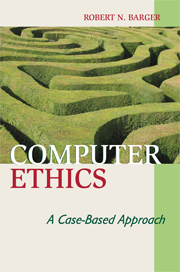Book contents
- Frontmatter
- Contents
- Preface
- Acknowledgments
- 1 Introduction
- 2 The Computer as a Humanizing Agent
- 3 Philosophic Belief Systems
- 4 A Philosophic Inventory
- 5 The Possibility of a Unifying Ethical Theory
- 6 The Ethical Decision-Making Process
- 7 Psychology and Computer Ethics
- 8 The Computing Field as a Profession
- 9 Computer-Related Codes of Ethics
- 10 Computer Ethics and International Development
- 11 Robotics and Ethics
- 12 Theft and Piracy Concerns
- 13 Cases Concerning Theft and Piracy
- 14 Privacy Concerns
- 15 Cases Concerning Privacy
- 16 Power Concerns
- 17 Cases Concerning Power
- 18 A Miscellaneous Collection of Cases
- 19 Parasitic Computing Case
- Appendix: Topics for Presentations, Discussions, and Papers
- Notes
- Selected Bibliography
- Index
8 - The Computing Field as a Profession
Published online by Cambridge University Press: 05 June 2012
- Frontmatter
- Contents
- Preface
- Acknowledgments
- 1 Introduction
- 2 The Computer as a Humanizing Agent
- 3 Philosophic Belief Systems
- 4 A Philosophic Inventory
- 5 The Possibility of a Unifying Ethical Theory
- 6 The Ethical Decision-Making Process
- 7 Psychology and Computer Ethics
- 8 The Computing Field as a Profession
- 9 Computer-Related Codes of Ethics
- 10 Computer Ethics and International Development
- 11 Robotics and Ethics
- 12 Theft and Piracy Concerns
- 13 Cases Concerning Theft and Piracy
- 14 Privacy Concerns
- 15 Cases Concerning Privacy
- 16 Power Concerns
- 17 Cases Concerning Power
- 18 A Miscellaneous Collection of Cases
- 19 Parasitic Computing Case
- Appendix: Topics for Presentations, Discussions, and Papers
- Notes
- Selected Bibliography
- Index
Summary
Introduction
Four traits have traditionally characterized a profession: expert knowledge, autonomy in conducting one's practice, internal governance of one's professional field, and service to society. Each of these will be examined.
Expert Knowledge
Expert knowledge is special technical knowledge that is certified by some authority and is not possessed by the layperson. George Bernard Shaw once said that every profession is a conspiracy against the laity. Expert knowledge is related to skill, which may be learned “on the job.” Indeed, in earlier times some professions were learned in an apprenticeship manner. Would-be lawyers “read law” in law offices and would-be physicians went along on house calls with doctors and assisted them in their practices. The practice of going on “hospital rounds” is still a part of medical education today.
Autonomy
Autonomy involves independence in conducting one's professional practice in the areas of diagnosis, treatment, and follow-up – to use the language of the medical profession. Diagnosis deals with finding the root of the problem that needs to be treated. Treatment involves discovering what should be done to alleviate the problem. Follow-up is concerned with evaluation, that is, checking to see if the treatment was effective.
Internal Governance
Internal governance means that one's professional field is controlled by its practitioners rather than by some external authority. It includes the setting of entrance requirements and the handling of the discipline of one's errant colleagues.
Information
- Type
- Chapter
- Information
- Computer EthicsA Case-based Approach, pp. 85 - 89Publisher: Cambridge University PressPrint publication year: 2008
